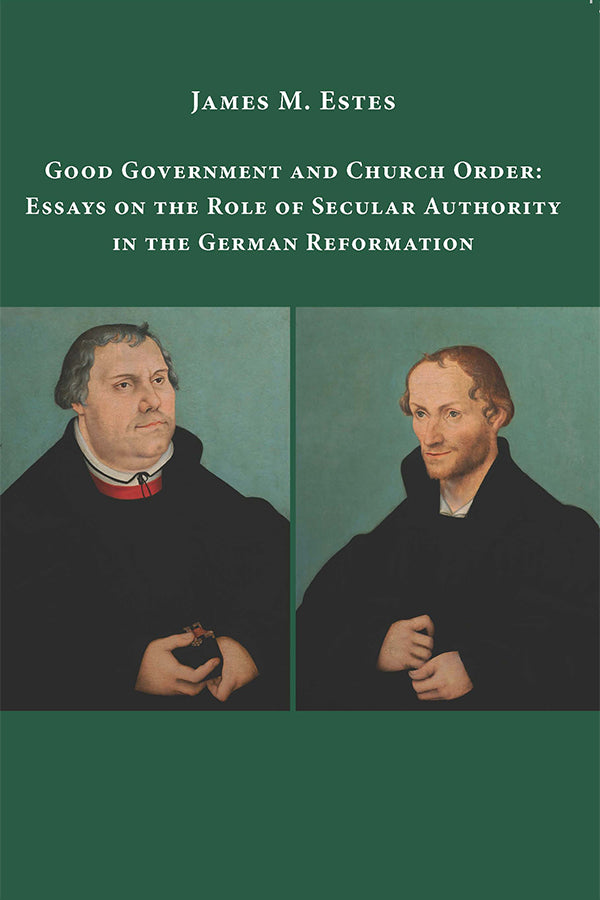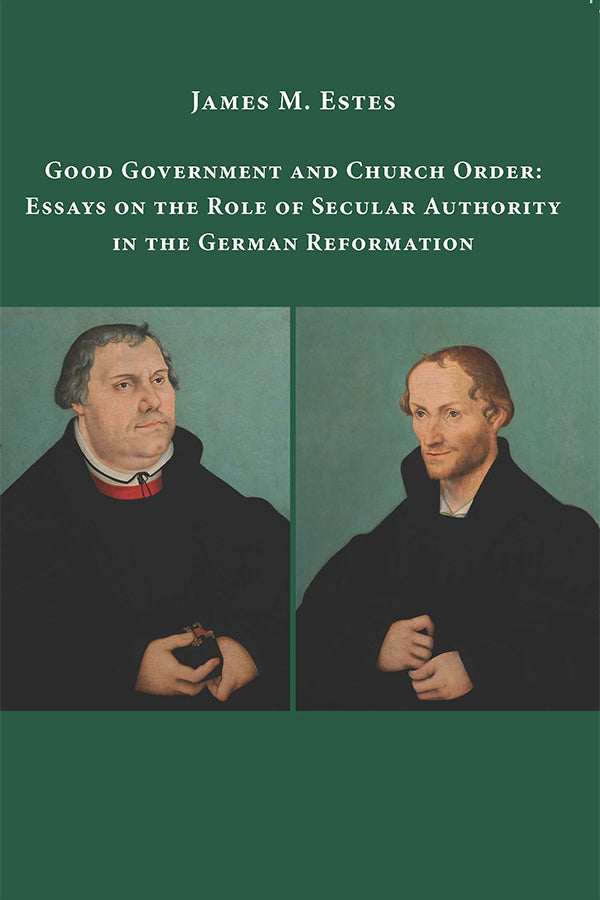Good Government and Church Order: Essays on the Role of Secular Authority in the German Reformation
By James M. Estes - ES53
Regular price
$49.95 CAD
Regular price
Sale price
$49.95 CAD
Unit price
per
Overview
The essays in this volume, written over the span of five decades, are in most cases an exploration of the often unrecognized or poorly understood relationships among four reformers who were advocates of governmental responsibility for religious reform: Erasmus of Rotterdam, Martin Luther, Philip Melanchthon, and Johannes Brenz. Erasmus’s long suspected but little investigated influence on the first generation of Protestant reformers is clearly documented in the cases of Philip Melanchthon and Johannes Brenz, both of whom made adroit use of Erasmian arguments, in conjunction with ideas taken from Luther, in their early appeals for government support of reform (1519–1530). Meanwhile, Luther himself, unwilling to concede to secular authority as such any responsibility in spiritual matters, had to address his appeals to Christian secular rulers in their capacity as participants in the priesthood of all believers who had a special obligation to come to the aid of the church in an emergency.
Then, starting in 1530, Luther, Melanchthon, and Brenz, faced with potent criticism from Radicals, Spiritualists, and other religious dissidents who denied the right of Protestant rulers to impose religious orthodoxy, had to rethink and adapt their arguments. It was Melanchthon who formulated the most cogent version of the Lutheran doctrine of the cura religionis of secular government, doing so in close cooperation and complete agreement with Luther, something that generations of Reformation scholars were unable or unwilling to see. As for Brenz, he adopted Melanchthon’s view almost verbatim in the process of establishing himself as the most gifted church organizer of all the early Lutheran reformers.
Then, starting in 1530, Luther, Melanchthon, and Brenz, faced with potent criticism from Radicals, Spiritualists, and other religious dissidents who denied the right of Protestant rulers to impose religious orthodoxy, had to rethink and adapt their arguments. It was Melanchthon who formulated the most cogent version of the Lutheran doctrine of the cura religionis of secular government, doing so in close cooperation and complete agreement with Luther, something that generations of Reformation scholars were unable or unwilling to see. As for Brenz, he adopted Melanchthon’s view almost verbatim in the process of establishing himself as the most gifted church organizer of all the early Lutheran reformers.
James M. Estes, an authority on the German Reformation, is professor emeritus of history at the University of Toronto, chair emeritus of the editorial board of the Collected Works of Erasmus (University of Toronto Press), and historical annotator of ten of the twenty-one volumes in the correspondence series of that edition.
326 pp., 4 ill.
ISBN: 978-0-7727-2224-9
Published: 2022
Contents
Preface
- Johannes Brenz and the Institutionalization of the Reformation in Württemberg
- Johannes Brenz and the Problem of Ecclesiastical Discipline
- Officium principis christiani: Erasmus and the Origins of the Protestant Territorial Church in Germany
- Surviving the Interim: the Case of Johannes Brenz and the Duchy of Württemberg
- Erasmus, Melanchthon, and the Office of Christian Magistrate
- The Role of Godly Magistrates in the Church: Melanchthon as Luther’s Interpreter and Collaborator
- Luther’s First Appeal to Secular Authorities for Help With Church Reform, 1520
- Melanchthon’s Confrontation With the “Erasmian” Via media in Politics: The Treatise De officio principum of 1539
- Johannes Brenz and the German Reformation
- Luther and the Role of Secular Authority in the Reformation
- Luther’s Attitude Towards the Legal Traditions of His Time
Appendix — Philip Melanchthon, Concerning the Office of Princes, that God’s Command Instructs Them to Remove Ecclesiastical Abuses
Praise
“In highlighting the vital link between Erasmus and the Wittenberg theologians, James M. Estes’s ground-breaking contributions bring together two disparate strands of research and point the way to a more nuanced understanding of the early Reformation.” — Amy Nelson Burnett, University of Nebraska-Lincoln
“Estes’s work on Melanchthon, Erasmus, and Luther stands at the forefront of fine Reformation history writing. By focusing on the ‘secular’ problem of princes and their churches, Estes advances new insights into the religious nature of government and its relation to the Reformation and the church.” — Timothy J. Wengert, United Lutheran Seminary
“Estes’s work on Melanchthon, Erasmus, and Luther stands at the forefront of fine Reformation history writing. By focusing on the ‘secular’ problem of princes and their churches, Estes advances new insights into the religious nature of government and its relation to the Reformation and the church.” — Timothy J. Wengert, United Lutheran Seminary
Reviews
"Estes explores subtleties as well as anyone and excels at context. He takes on topics that still dismay us, and tells us what the reformers thought about them. He respects his readers and his sources. When he asks a question he answers it." — Willis Goth Regier, University of Illinois in Renaissance and Reformation, volume 46 no.2
Couldn't load pickup availability


